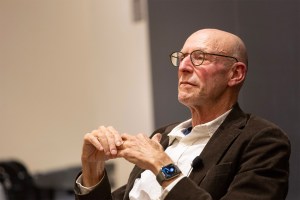Health
-

How realistic is ‘The Pitt’?
Doctors weigh in on what hit TV show gets right and wrong about life in the ER — from pacing and caseloads to workplace culture (and that waiting room from hell)
-

Yoga can help cut severe, initial opioid-withdrawal period in half, study finds
Researchers say results could dramatically increase chances of recovery
-

6 keys to a long, healthy life (ice cream included)
Also, why reading Ben Franklin beats climbing Mount Everest
-

Six cancers rising faster in younger adults than older ones
Large new global study fuels growing concern over trend of increases in several types

-

What’s next for GLP-1s?
Scientists eye new treatment targets for popular weight-loss drugs, from heart failure to addiction
-

Drinking 2-3 cups of coffee a day tied to lower dementia risk
Caffeinated tea also found to slow cognitive decline in study

-
Link between deep sleep and visual learning
A relationship has been observed between deep sleep and the ability of the brain to learn specific tasks. Researchers at Harvard-affiliated Brigham and Women’s Hospital (BWH) have now shown that the processes that regulates deep sleep may affect visual learning. These results are published in the March 12 issue of the Journal of Neuroscience.
-
Study shows indicator for cardiovascular events
A study appearing in this week’s (March 19) New England Journal of Medicine (NEJM) confirms that a combination of gene variants previously associated with cholesterol levels does reflect patients’ cholesterol levels and can signify increased risk of heart attack, stroke, or sudden cardiac death. Led by researchers from the Massachusetts General Hospital (MGH) cardiology division, the study’s findings are a first step toward the ability to identify individuals who might benefit from earlier use of cholesterol-lowering medications and other measures to combat elevated risk.
-
MGH initiates Phase I of its diabetes trial
Scientists at Massachusetts General Hospital (MGH) have initiated a Phase I clinical trial to reverse type 1 diabetes. The trial is exploring whether the promising results from the laboratory of Denise Faustman can be applied in human diabetes.
-
Study: Know thyself and you’ll know others better
Using functional MRI (fMRI) scanning, researchers have found that the region of the brain associated with introspective thought “lights up” when people infer the thoughts of others like themselves. However, this is not the case when we’re considering people we think of as different politically, socially, or religiously. Published in the current issue of the Proceedings of the National Academy of Sciences, the study was led by Adrianna Jenkins, a graduate student in the Department of Psychology in the Faculty of Arts and Sciences at Harvard University, with Jason Mitchell, assistant professor of psychology at Harvard. Jenkins and Mitchell’s co-author was C. Neil Mcrae of the University of Aberdeen.
-
Punishment doesn’t earn rewards
Individuals who engage in costly punishment do not benefit from their behavior, according to a new study published this week in the journal Nature by researchers at Harvard University and the Stockholm School of Economics.
-
Increasing U.S. support could save a million South Africans by 2012
More that 1.2 million deaths could be prevented in South Africa over the next five years by accelerating efforts to provide access to antiretroviral therapy (ART), according to a study released March 13 in the Journal of Infectious Diseases.
-
Stem cells open window on disease processes
A panel of Harvard Stem Cell Institute experts said recently that stem cell research’s biggest impact on patients’ health likely won’t come from therapies that inject stem cells or implant…
-
MGH receives Gates Foundation grant
The Massachusetts General Hospital (MGH) has received a five-year, $20.5 million grant from the Bill & Melinda Gates Foundation to expand an international program investigating the biological factors underlying immune system control of HIV, the virus that causes AIDS. The grant provides support to the International HIV Controllers Study, which currently involves researchers from more than a dozen countries and has the overall goal of discovering information that can guide design of a vaccine to limit viral replication in HIV-infected individuals. A primary focus will be to understand the genetic and immunological factors that have allowed a few individuals to control HIV naturally without the need for medications, some for more than 25 years.
-
Late treatment with letrozole can reduce cancer recurrence risk
Treatment with the aromatase inhibitor letrozole (Femara) can reduce the risk of breast cancer recurrence even when initiated one to seven years after a course of tamoxifen therapy. The results of a study involving women originally in the placebo arm of an international trial of letrozole will appear in the Journal of Clinical Oncology and are receiving early online release. Among those who chose to begin letrozole treatment after the initial trial was halted, the risk that their cancer would recur was cut in half compared with those who never received letrozole. In addition, the risk of metastasis was 60 percent lower with letrozole, and the chance that a new tumor would develop in the unaffected breast dropped more than 80 percent.
-
Protein folding: Life’s vital origami
The way proteins fold, and the good and bad effects of this molecular phenomenon, are what keeps biologist Susan L. Lindquist busy. Lindquist Ph.D. ’76, a Radcliffe Fellow this year, is an award-winning professor and researcher at the Massachusetts Institute of Technology (MIT) and a former director of the Whitehead Institute. She shared her insights on protein folding with an audience of 70 last week (March 5) at the fellowship program’s 34 Concord Ave. headquarters.
-
Harvard faculty members discuss state of research
A panel of experts said Tuesday (March 11) that stem cell research’s biggest impact on patients’ health likely won’t come from therapies that inject stem cells or implant tissues made from them, but rather from the knowledge gained by examining diseased tissues grown from the cells.
-
Inhaled TB vaccine more effective than traditional shot
A novel aerosol version of the most common tuberculosis (TB) vaccine, administered directly to the lungs as an oral mist, offers significantly better protection against the disease in experimental animals than a comparable dose of the traditional injected vaccine, researchers report this week (March 12) in the Proceedings of the National Academy of Sciences (PNAS). The aerosol vaccine — under development through a collaboration between Harvard University and the international not-for-profit Medicine in Need (MEND) — could provide a low-cost, needle-free TB treatment that is highly stable at room temperature.
-
Sobering look at ‘mind-body connection’
Mind-body medicine goes by many names today — including holistic, complementary, or alternative medicine. Regardless of what it’s called, many people embrace the ideas behind the mind-body connection and its effect on health, sometimes despite a lack of supporting scientific evidence. In her recently published book, “The Cure Within: A History of Mind-Body Medicine” (W.W. Norton and Company, 2008), Anne Harrington explores the long-lived and widespread belief in these unconventional medical practices.
-
President testifies for increase in NIH funding
With the careers of a generation of young researchers threatened by five years of flat National Institutes of Health (NIH) funding, Harvard President Drew Faust and leaders of six other major research institutions were in Washington Tuesday (March 11) calling on Congress to repair the “Broken Pipeline” through which breakthroughs in the biomedical sciences should be flowing.
-
Ecologist Jeremy Jackson to receive Roger Tory Peterson Medal
Jeremy Jackson, renowned marine ecologist of the Scripps Institution of Oceanography, has been selected to receive the 11th annual Roger Tory Peterson Medal presented by the Harvard Museum of Natural History (HMNH). Jackson will deliver the Roger Tory Peterson Memorial Lecture on April 6 at 3 p.m. in the Science Center, 1 Oxford St.
-
Initial human trial of Type 1 diabetes treatment begun
Scientists at the Massachusetts General Hospital (MGH) have initiated a phase 1 clinical trial to reverse type 1 diabetes. The trial is exploring whether the promising results from the laboratory…
-
Inhaled tuberculosis vaccine may be more effective than injected vaccine
A novel aerosol version of the most common tuberculosis (TB) vaccine, administered directly to the lungs as an oral mist, offers significantly better protection against the disease in experimental animals…
-
HSPH establishes new three-year grant program
The Harvard School of Public Health (HSPH) has announced the establishment of the A.G. Leventis Foundation Fellowship Program with a three-year grant to support Cypriot/Greek and Nigerian students and scholars in public health.
-
Of flies and fish
During her schooldays in 1950s Germany, Christiane Nüsslein-Volhard rarely did her homework. In 1995, she won the Nobel Prize for physiology and medicine. Volhard is now director of the prestigious Max Planck Institute for Developmental Biology in Tübingen, where, decades before, she had been an undistinguished biochemistry undergraduate. She was at Harvard this week (March 4) to deliver a talk sponsored by the Radcliffe Institute for Advanced Study as part of its Dean’s Lecture Series.
-
Gene variants probably increase risk for anxiety disorders
Massachusetts General Hospital (MGH) researchers — in collaboration with scientists at the University of California, San Diego, and Yale University — have discovered perhaps the strongest evidence yet linking variation in a particular gene with anxiety-related traits. In the March issue of Archives of General Psychiatry, the team describes finding that particular versions of a gene that affects the activity of important neurotransmitter receptors were more common in both children and adults assessed as being inhibited or introverted and also were associated with increased activity of brain regions involved in emotional processing.
-
Biologist Venter will be visiting scholar at Origins of Life Initiative
J. Craig Venter, the visionary biologist and intellectual entrepreneur who was a leading figure in the decoding of the human genome, will join Harvard University as a visiting scholar at the University’s Origins of Life Initiative.
-
HMS, Broad Institute team works to better understand mitochondria
Why do nearly 1 million people taking cholesterol-lowering statins often experience muscle cramps? Why is it that in the rare case when a diabetic takes medication for intestinal worms, his glucose levels improve? Is there any scientific basis for the purported health effects of green tea?
-
Portion of encyclopedic ‘macroscope’ unveiled
The first 30,000 pages of a massive online Encyclopedia of Life were unveiled last week at the Technology, Entertainment and Design (TED) conference in Monterey, Calif. The project was congratulated by E.O. Wilson, Pellegrino University Professor Emeritus, who articulated the need for a dynamic modern portrait of biodiversity in a widely read essay in 2003. “The launch of the Encyclopedia of Life will have a profound and creative effect in science,” Wilson said. “It aims not only to summarize all that we know of Earth’s life forms, but also to accelerate the discovery of the vast array that remain unknown.”
-
Research in brief
GROWING U.S. DISPARITIES IN HEALTH NOT INEVITABLE NEW WAY TO GROW BLOOD VESSELS
-
History of Women in Medicine fellowship material due March 1
The Foundation for the History of Women in Medicine (FHWIM) is offering two fellowships to support research conducted at the Center for the History of Medicine and its Archives for Women in Medicine, located at Harvard Medical School’s Countway Library.
-
University, students unite for mental health
If a student is struggling, stressed-out, or having trouble coping with pressure, the University is here to listen and help. That’s the theme behind this year’s “Speak Out, Mental Health at Harvard,” a weeklong series of events to engage the student body in active campus dialogues about mental health.
-
A doctor without borders
Oleksiy Skrynnyk was just a carefree 9-year-old, his fishing rod slung over his shoulder as he walked home from his favorite pond. He never saw the low-hanging power line. Twenty-two hundred volts shot through his body, entering his right shoulder and exiting out his left foot. The electrocution burns were extensive. His right arm was so badly injured it had to be amputated. Though the level of care in Oleksiy’s homeland was what saved his life, his mother, Olga Zabolotina, knew her son needed more.
-
Giurini named President of American College of Foot and Ankle Surgeons
John M. Giurini, Chief of the Division of Podiatric Medicine and Surgery at Beth Israel Deaconess Medical Center and an Associate Professor in Surgery at Harvard Medical School was installed…
-
Restricting insulin doses increases mortality risk
A new study led by researchers at the Joslin Diabetes Center has found that women with type 1 diabetes who reported taking less insulin than prescribed had a three-fold increased…
-
New strategy identified for improving effectiveness of cancer therapies
Manipulating levels of nitric oxide, a gas involved in many biological processes, may improve the disorganized network of blood vessels supplying tumors, potentially improving the effectiveness of radiation and chemotherapy. …


